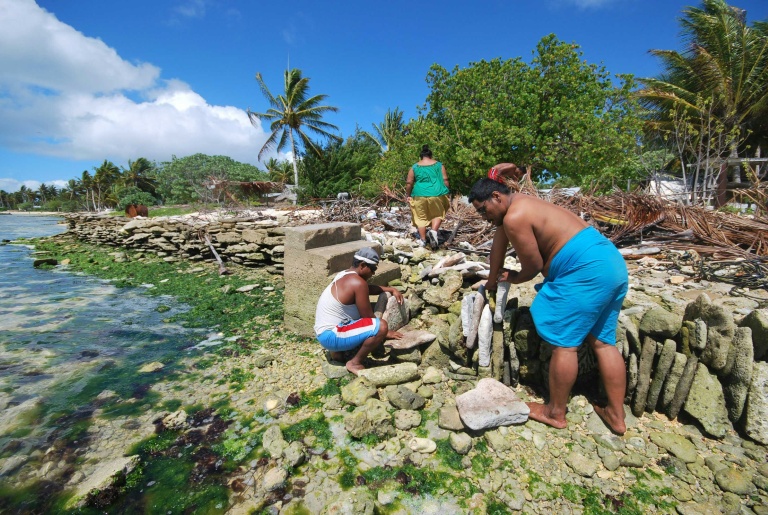Climate summit: The crunch issues
 |
| Smoke billowing from the chimneys of a petrochemical factory. (File photo: AFP/File/Philippe Desmazes) |
PARIS: On November 30, some 120 heads of government and state will kick off a high-stakes negotiation to curb global warming and help poor countries cope with its impacts.
The parlay runs until December 11.
The objective: the first-ever universal climate deal to include all of the 195 nations under the umbrella of the UN Framework Convention on Climate Change.
Dozens of issues have stymied the negotiations, now into their third decade. Here are the key points of contention:
MITIGATION
All countries agree that greenhouse-gas emissions which drive warming must be curbed. But by how much?
The UN has endorsed a global warming ceiling of two degrees Celsius (3.6 degrees Fahrenheit) over pre-industrial levels. But poor countries and low-lying, small-island states - which will be hit first and hardest by climate change - call for a tougher goal of 1.5°C (2.4°F).
Timing is important too: To have a 50/50 shot at 2°C, global CO2 emissions must peak by 2025 and drop dramatically thereafter, scientists say.
FAIRNESS
The 1992 UNFCCC charter enshrines the principle that rich countries - historically responsible for warming - should do more to fix it. That divide was codified in the 1997 Kyoto Protocol, which went into force in 2005 and placed emissions-curbing targets on industrialised nations. The United States did not ratify the plan.
Much has changed since the principle of "differentiated responsibility" was set in stone nearly 25 years ago. Fast-growing China and India have become the world's number one and four carbon emitters, and erstwhile "developing" countries have scaled the economic ladder.
At the same time, the European Union and United States have reduced their per capita carbon emissions.
Developing nations insist that industrialised countries should do more to cut emissions, having polluted for much longer. But rich countries insist on liability for all.
 |
| Inhabitants of Kiritimati atoll in the Pacific build a stone seawall to protect their homes as sea levels rise due to global warming. (Photo: AFP) |
The hugely contentious issue touches on all aspects of the deal - from setting emissions goals and agreeing on a review system, to the flow of climate aid.
MONEY
One of the few concrete decisions to come out of the 2009 UN climate conference in Copenhagen was a pledge from rich economies to muster US$100 billion per year in financial support for poor countries from 2020.
The money will help develop technology and build infrastructure to cut emissions. It will also be used to adapt to climate impacts - like rising seas and spreading deserts - which can no longer be avoided. Exactly where that money will come from and how it will be distributed have yet to be worked out.
More recently, least-developed countries, small-island and developing states have sought additional payment for climate "loss and damage". Rich nations balk the concept of "compensation".
REVIEW
The proposed Paris accord will have as its backbone a roster of voluntary national pledges for reducing carbon emissions. China, the United States and the EU - which together account for more than half of global CO2 pollution - have submitted theirs, along with more than 150 other nations.
But scientists say the sum of global commitments will not meet the 2°C objective. As a result, some countries have proposed putting in place a process to "ratchet up" national emissions efforts and financial commitments.
There are disagreements about when the first review of national actions must take place, how often it should be repeated, and whether there should be a duty on countries to automatically ramp up action.
What the stars mean:
★ Poor ★ ★ Promising ★★★ Good ★★★★ Very good ★★★★★ Exceptional
Latest News
More News
- Russian President congratulates Vietnamese Party leader during phone talks (January 25, 2026 | 09:58)
- Worldwide congratulations underscore confidence in Vietnam’s 14th Party Congress (January 23, 2026 | 09:02)
- Political parties, organisations, int’l friends send congratulations to 14th National Party Congress (January 22, 2026 | 09:33)
- 14th National Party Congress: Japanese media highlight Vietnam’s growth targets (January 21, 2026 | 09:46)
- 14th National Party Congress: Driving force for Vietnam to continue renewal, innovation, breakthroughs (January 21, 2026 | 09:42)
- Vietnam remains spiritual support for progressive forces: Colombian party leader (January 21, 2026 | 08:00)
- Int'l media provides large coverage of 14th National Party Congress's first working day (January 20, 2026 | 09:09)
- Vietnamese firms win top honours at ASEAN Digital Awards (January 16, 2026 | 16:45)
- ASEAN Digital Ministers' Meeting opens in Hanoi (January 15, 2026 | 15:33)
- ASEAN economies move up the global chip value chain (December 09, 2025 | 13:32)
















 Mobile Version
Mobile Version